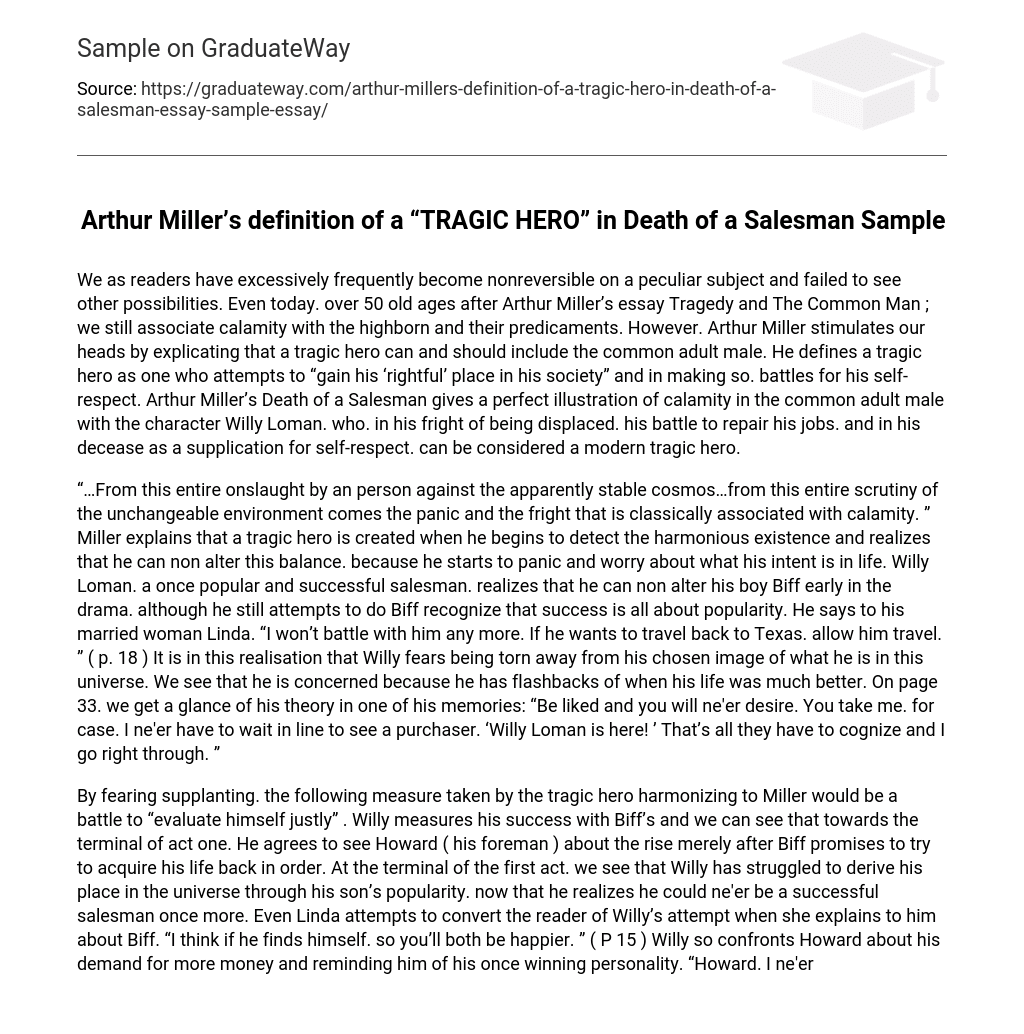We as readers have excessively frequently become nonreversible on a peculiar subject and failed to see other possibilities. Even today. over 50 old ages after Arthur Miller’s essay Tragedy and The Common Man ; we still associate calamity with the highborn and their predicaments. However. Arthur Miller stimulates our heads by explicating that a tragic hero can and should include the common adult male. He defines a tragic hero as one who attempts to “gain his ‘rightful’ place in his society” and in making so. battles for his self-respect. Arthur Miller’s Death of a Salesman gives a perfect illustration of calamity in the common adult male with the character Willy Loman. who. in his fright of being displaced. his battle to repair his jobs. and in his decease as a supplication for self-respect. can be considered a modern tragic hero.
“…From this entire onslaught by an person against the apparently stable cosmos…from this entire scrutiny of the unchangeable environment comes the panic and the fright that is classically associated with calamity. ” Miller explains that a tragic hero is created when he begins to detect the harmonious existence and realizes that he can non alter this balance. because he starts to panic and worry about what his intent is in life. Willy Loman. a once popular and successful salesman. realizes that he can non alter his boy Biff early in the drama. although he still attempts to do Biff recognize that success is all about popularity. He says to his married woman Linda. “I won’t battle with him any more. If he wants to travel back to Texas. allow him travel. ” ( p. 18 ) It is in this realisation that Willy fears being torn away from his chosen image of what he is in this universe. We see that he is concerned because he has flashbacks of when his life was much better. On page 33. we get a glance of his theory in one of his memories: “Be liked and you will ne’er desire. You take me. for case. I ne’er have to wait in line to see a purchaser. ‘Willy Loman is here! ’ That’s all they have to cognize and I go right through. ”
By fearing supplanting. the following measure taken by the tragic hero harmonizing to Miller would be a battle to “evaluate himself justly” . Willy measures his success with Biff’s and we can see that towards the terminal of act one. He agrees to see Howard ( his foreman ) about the rise merely after Biff promises to try to acquire his life back in order. At the terminal of the first act. we see that Willy has struggled to derive his place in the universe through his son’s popularity. now that he realizes he could ne’er be a successful salesman once more. Even Linda attempts to convert the reader of Willy’s attempt when she explains to him about Biff. “I think if he finds himself. so you’ll both be happier. ” ( P 15 ) Willy so confronts Howard about his demand for more money and reminding him of his once winning personality. “Howard. I ne’er asked a favour of any man…Your male parent came to me the twenty-four hours you were born and asked me what I thought of the name Howard…” ( p 80 ) . He starts to demo his demand for his self-respect. which is an of import facet of a tragic hero harmonizing to Miller’s definition.
He shows embarrassment when Howard criticizes him. He refuses a occupation offer from his friend Charley. All these factors lead to his ruin. as the reader can now clearly understand why Willy Loman has failed as a salesman every bit good as a male parent and hubby. Yet still. after he is fired Willy does non accept failure as he believes there is still a opportunity because Biff might hold gotten a new occupation to repair everything. He finds out that Biff’s old employer did even acknowledge him. and alternatively of seeing that his boy has grown into person more mature and capable to taking a happy life because of this incident. he gets into an statement with him. The drama ends with his son’s confrontation with the defects in their relationship. Hearing that his boy loved him. his self-destruction was an chance to procure his sense of personal self-respect. The job with Willy Loman was what Arthur Miller explains as the tragic flaw–he was loath to “remain inactive in the face of what he conceives to be a challenge of his self-respect. his image of his rightful status” .
In that definition of the tragic defect lies a sense of optimism. an adjectival non normally given to calamities. Arthur Miller feels that they should be considered optimistic in that a calamity “reinforces the onlooker’s brightest sentiments of the human animal” . His essay is the perfect concomitant to one of his greatest plant. Truly. Willy Loman is a tragic hero despite Aristotle’s definition of a tragic hero being of royal position and “arouses our pity” through his booby traps. It didn’t seem that the common adult male could besides be a tragic hero because his bad lucks would non be excessively utmost and should be expected. But Arthur Miller points out that sing the noble’s adversity does non look to excite the modern audience. Possibly better understanding a true tragic hero would shortly do up for the deficiency of calamities written in this age. as Miller complains.





